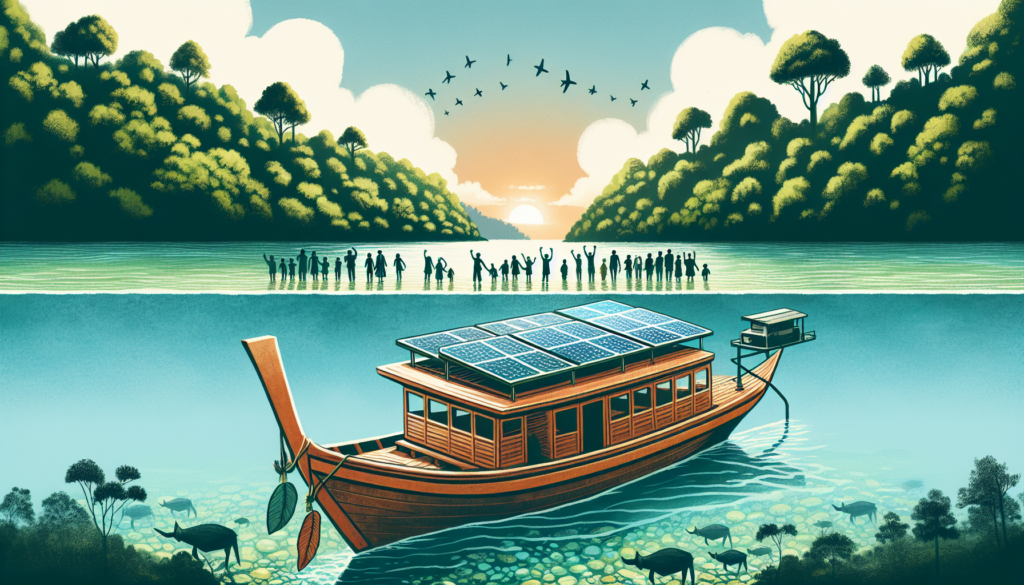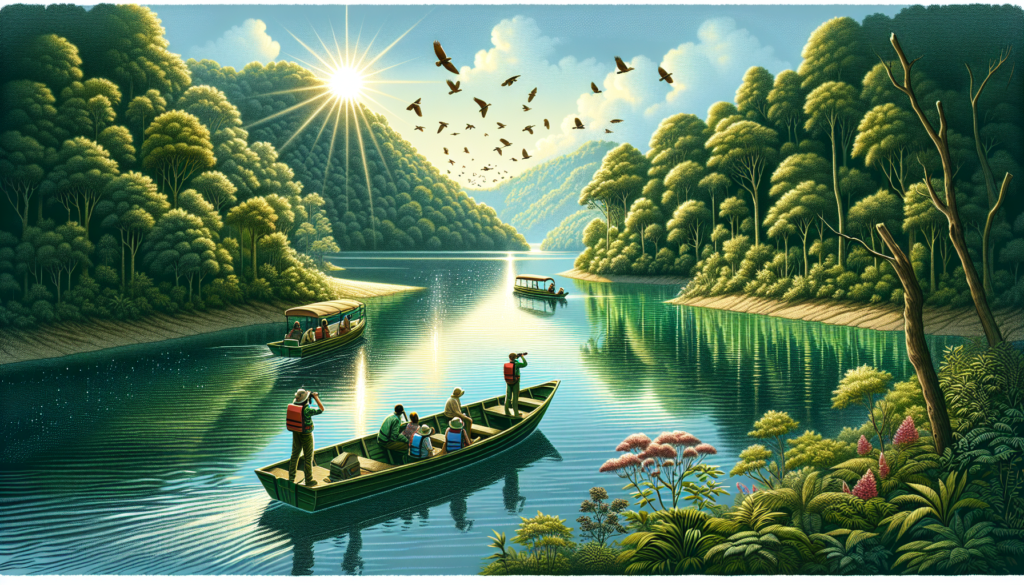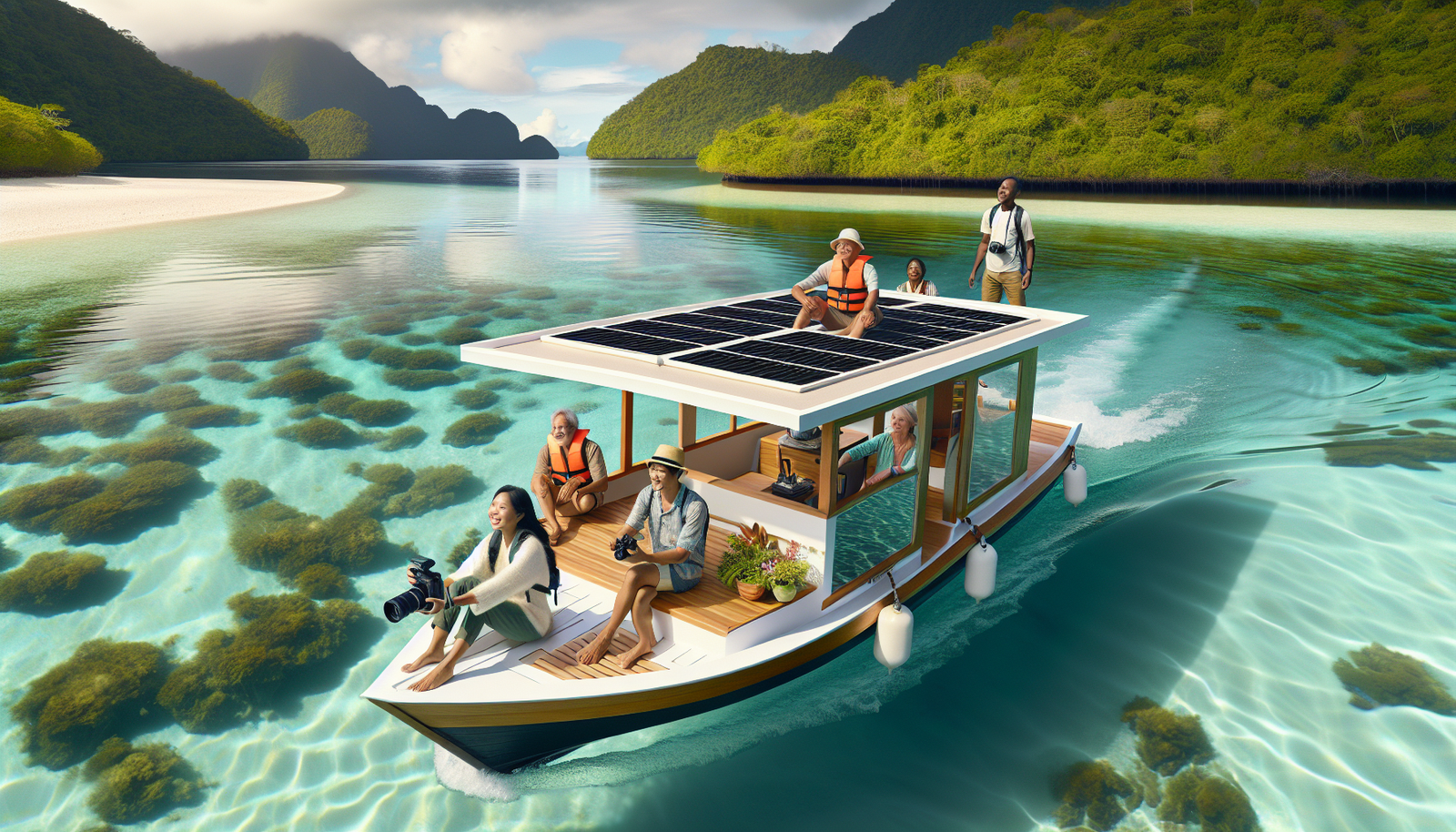Imagine setting sail on clear blue waters, under vast, unbroken skies, surrounded by nature’s stunning beauty. “The Benefits of Eco-Tourism through Boating Expeditions” will explore this eco-friendly travel where you not only experience captivating sights, sounds, and sensations of the Earth’s aquatic ecosystems, but also contribute to their preservation. It will take you through the wonders of eco-tourism, especially via boating expeditions, and help you discover new, sustainable ways to satiate your wanderlust, all while helping out Mother Earth.

Understanding Eco-Tourism
Eco-Tourism is about more than just sightseeing or taking photos for the ‘gram’. It’s an immersive, often transformative, way of travelling that respects the natural world and seeks to make a positive impact on both the environment and the people who live in the places you visit. Informed by the principle of doing no harm (or as little as possible), it’s about understanding the interconnections among people, place, culture, and ecology.
Definitions and principles of Eco-Tourism
At its core, eco-tourism is responsible travel to natural areas that conserves the environment, sustains the well-being of the local people, and involves interpretation and education. It’s about uniting conservation, communities, and sustainable travel. It’s about connecting with nature, but doing it in a way that preserves that nature for future generations.
The history and development of Eco-Tourism
The idea of eco-tourism has been around for several decades, but it’s really only in the past 20 or so years that it’s taken off as a popular travel trend. An increasing awareness of our environmental footprint and a desire to travel more responsibly are factors that have contributed to its growth. What started as a niche movement has now become mainstream and is transforming the way we think about travel.
The Concept of Boating Expeditions
Boating expeditions can be an exciting and unique form of eco-tourism. It offers you the chance to explore areas that are often inaccessible by other means. The boating expeditions range from kayaking in a mountain lake to sailing on the high seas.
Role of boating expeditions in Eco-Tourism
Boating expeditions play a key role in eco-tourism. They offer travelers a chance to see aspects of nature that they might not otherwise be able to access, such as offshore islands, secluded coves, and unique marine habitats. Boats can also be used to support conservation initiatives, such as marine survey work or wildlife monitoring.
Varieties of boating expeditions in Eco-Tourism
From canoes to sailboats to chartered tours, there’s a boating expedition for everyone’s comfort and experience level. You can drift down a wild river, spotting wildlife along the banks, or sail along the coast with a group of like-minded adventurers.

Benefits of Eco-Tourism
Eco-tourism, like any other form of travel, brings its own set of benefits. From environmental to social to economic, these benefits are often intertwined, creating a ripple effect that can be felt far beyond the tourist’s adventure.
Environmental benefits of Eco-Tourism
Eco-tourism helps preserve natural habitats and protect endangered species by encouraging responsible travel. It also helps to fund conservation efforts and support the maintenance of national parks and wildlife sanctuaries.
Social benefits of Eco-Tourism
One of the fundamental aspects of eco-tourism is that it aims to benefit local communities. Involving locals in eco-tourism initiatives can empower them, provide jobs, and allow them to share and preserve their culture and traditions.
Economic benefits of Eco-Tourism
Eco-tourism can create job opportunities and contribute to local economy. It can also generate revenue that can be reinvested into local conservation efforts. The money you spend on a guided tour or a homestay can go directly into the pockets of local individuals and families.
Specific Advantages of Boating Expeditions in Eco-Tourism
Boating expeditions bring additional benefits to the broader field of eco-tourism. They enhance local economies, promote sustainable travel practices, and provide opportunities for unique wildlife experiences.
Contributions to local economies
Boating expeditions can make a crucial contribution to local economies. They create jobs for guides and crew members, and can stimulate business for local suppliers and service providers.
Promotion of sustainable travel practices
As a part of eco-tourism, boating expeditions promote sustainable travel practices. They encourage responsible behaviors like picking up after yourself, respecting wildlife, and sticking to designated routes, which help ensure the natural environment remains unspoilt.
Opportunities for unique wildlife experiences
Boating expeditions can offer unique wildlife experiences that might not be possible by land. They can provide spectacular views of water-dwelling creatures and rare sightings of unique bird species or other marine life.

Promoting Environmental Education and Awareness
One of the key aims of boating expeditions in eco-tourism is promoting environmental education and awareness among travelers.
Role of boating expeditions in environmental education
Boating expeditions can serve as a unique platform for environmental education. They offer first-hand experiences with marine and coastal ecosystems, and the opportunity to learn about local flora, fauna, and biodiversity.
Impact on local and international conservation efforts
By supporting local conservation efforts and fostering a deeper understanding and appreciation of nature among travelers, boating expeditions can have a significant impact on both local and international conservation initiatives.
Enhancing Cultural Understanding and Respect
Cultural understanding and respect are integral aspects of eco-tourism. Interaction with local communities during boating expeditions can foster these values.
Interaction with local communities during boating expeditions
When embarking on a boating expedition, you can often meet and learn from local people who know the waterways and their surrounding environments best. This can foster valuable cross-cultural exchange and encourage greater respect for local customs and traditions.
Preservation and appreciation of local traditions and customs
Many boating expeditions also involve visiting coastal communities and partaking in local traditions and customs. This can help conserve and promote these traditions, as well as fostering a deeper appreciation for different cultures amongst tourists.

Impacting Local Economies Positively
A positive impact on local economies is one of the most significant benefits of eco-tourism and boating expeditions.
Creation of employment opportunities
From guides and boat operators to accommodation and food suppliers, boating expeditions can create a wide range of employment opportunities in local communities.
Promotion of local products and services
These expeditions can also stimulate demand for local products and services. Whether it’s a restaurant serving up locally caught seafood, souvenirs made by local artisans, or a visit to a historic site, tourists’ expenditure helps support local enterprises.
Encouragement of community-based tourism initiatives
By encouraging community involvement in tourism initiatives, boating expeditions can foster a sense of ownership and pride amongst locals, whilst also ensuring that they directly benefit from the tourism revenue.
Practices for Sustainable Boating Expeditions
To maximize the benefits and minimize the potential negative impacts of boating expeditions, it’s crucial to adhere to sustainable practices.
Importance of adopting environmentally friendly boating practices
From operating equipment responsibly to limiting waste and not disturbing wildlife, adopting environmentally friendly boating practices ensures the protection and preservation of delicate marine and coastal environments.
Tips and guidelines for sustainable boating expeditions
Sticking to the designated waterways, carrying out all trash, recycling whenever possible, and using eco-friendly sunscreen and hygiene products are amongst the practices you can adopt. You can also choose to support tours that employ local community members and contribute to conservation efforts.
Challenges and Ways to Overcome
Like any form of tourism, boating expeditions too face challenges. Recognizing these challenges and finding ways to overcome them are crucial for the future of sustainable eco-tourism.
Potential environmental impact of boating expeditions
Boating expeditions, if not managed responsibly, can potentially harm the environment. This could be through water pollution, damage to coral reefs, and disturbance to local wildlife.
Solutions for sustainable Eco-Tourism through boating
Some of the ways to mitigate these challenges are by adopting stricter environmental guidelines, making responsible decisions during the expeditions, using eco-friendly equipment, and enhancing education and awareness among tourists.
Future of Eco-Tourism Through Boating Expeditions
Eco-Tourism and boating expeditions will likely evolve as we learn more about our impact on the environment and develop better ways of managing it.
Advancements and innovations in Eco-Tourism boating practices
Innovations like solar-powered boats and advancements in eco-friendly boating practices promise a future where boating expeditions can coexist harmoniously with nature.
Predicted trends and impacts on the tourism industry
More travelers are expected to seek out eco-tourism and boating expeditions as a way of connecting with nature and making a positive impact. This shift towards sustainable travel is set to bring profound changes to the tourism industry.
Case studies of successful Eco-Tourism boating expeditions
There are already many boating expeditions around the world that have successfully embraced eco-tourism principles. These case studies can provide crucial insights and inspiration for others in the industry.
In conclusion, whether you’re a seasoned sailor or a budding sea explorer, boating expeditions offer an exciting and responsible way to experience the marvels of our planet. So let’s set sail and chart a course for sustainable, eco-friendly travel!

